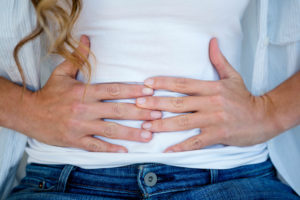
WHAT LEADS TO POOR GUT HEALTH, BLOATING AND BELLY PAIN?
In order to relieve your bloating and belly pain, it’s important to understand what can trigger it.
Factors such as imbalanced gut bacteria, stress, medications and even hormone imbalances can be potential triggers.
Your body is home to trillions of microscopic organisms – bacteria, fungi, viruses, and other microbes that make up what is called your “microbiome”. These organisms digest your food, keep your immune system in good shape, protect your intestines from infections and produce several vitamins.
Normal gut flora contains small amounts of “bad” bacteria – bugs that can cause disease when we have an overgrowth of them. When you have higher amounts of unhealthy bacteria than healthy bacteria excessive gas can result and lead to bloating and belly pain. Your gut flora, your diet and the integrity of your intestinal lining determine the health of your gut.
Factors that can lead to poor gut health:
- Diet: What you eat can help or harm the balance of your microbiome. Consuming sugary, chemically laden and processed foods feed the bad bacteria and yeast forms, lead to overgrowth and cause inflammation that can damage your gut lining.
- Stress: Chronic stress leads the production of high levels of the stress hormone cortisol and decreases delivery of oxygen to the gut. This can inflame and damage the lining of the gut.
- Over the counter and prescription medications:Antibiotics indiscriminately kill both bad and good microorganisms and disrupt the natural bacterial balance in the gut. Conventional meats, farmed fish and dairy products contain antibiotics so even if you haven’t taken them, it’s likely that you are getting antibiotics through your diet. Studies have shown that over-the-counter pain relievers like aspirin, ibuprofen, and naproxen can damage the lining and increase inflammation in the intestine and lead to increase permeability (leaky gut).
- Inflammation: Low stomach acid, yeast overgrowth, bacterial overgrowth, parasites and environmental toxins can lead to inflammation and cause the gut to become leaky.
- Hormone imbalances:Chronic inflammation damages the gut lining and causes it to become permeable or “leaky”. Imbalances of estrogen, progesterone, thyroid hormones and cortisol have been linked to poor healing of the damaged intestinal wall. Balancing hormones is often necessary in order to successfully heal the gut.
Bloating and belly pain can be a sign that you have an overgrowth of bacteria in the small intestine
- SIBO (small intestinal bacterial overgrowth) is a serious condition affecting the small intestine. It occurs when bacteria that should normally be found in the colon start growing in the small intestine.
- It can occur as a result of low stomach acid, long-term use of acid-blocking proton pump inhibitors (PPIs), steroids or frequent use of antibiotics.
- SIBO can cause bloating, gas, belly pain, nausea, constipation or diarrhea.
Assessing your gut health
It is important to run labs to determine the underlying cause your gut problems.
A GI-MAP is a DNA stool test. It is currently the most reliable stool test available. It tests for bacterial pathogens, viruses, parasites, fungal forms, levels or good bacteria, pancreatic enzyme levels, immune function, occult blood and inflammation.
Healing your gut
Once you know the status of your gut health, you can take the steps necessary to repair and heal you gut.
Steps to take to begin your journey to heal your gut:
- Follow an elimination diet: The first step to take in healing your gut is to follow an elimination diet.It is necessary to stop eating foods that damage your gut and increase inflammation. Bloating may be one of the first signs that you notice from food sensitivity or intolerance. Keeping a food diary will help you to determine which foods are problematic for you. The major food allergens include:
- Dairy
- Wheat
- Corn
- Eggs
- Oats
- Soy
- Shellfish
- Oranges, strawberries, pineapple, melons,
- Manage you stress: Chronic stress can decrease blood and oxygen flow to your intestines and contribute to gut lining permeability (leaky gut). The best ways to reduce stress include:
- Yoga
- Meditation
- Taking long walks
- Listening to The 3 Principles on You Tube – this has been life changing for my husband and I
- Helpful Supplements:
- Soil based probiotics containing Bacillus coagulans and B subtilis may be the best probiotics to take if you suffer from bloating and belly pain. This probiotic does not feed bacteria in the small intestine. Probiotics containing lactobacillus or bifidobacterium can make gas, bloating or other digestive symptoms worse if you have SIBO.
- Peppermint oil helps reduce inflammation, soothes the intestinal lining, calms the stomach and can reduce belly pain.
- Marshmallow root supports the repair of damaged gut lining and protects the gut against inflammation.
How to Resolve Your Chronic Bloating And Belly Pain
You must identify the root causes of your symptoms.
Here are the 7 most common root causes:
- Gut infections
- Small Intestinal Bacterial Overgrowth (SIBO)
- Leaky gut
- Food sensitivities
- Medication side effects
- Stress induced hormone imbalances
- Insufficient digestive secretions
Most people don’t know their underlying causes and these root causes cannot be found without proper comprehensive testing.
If you would like to work with a practitioner who’s been doing this for over 35 years, has personally experienced resolution from this nightmare and understands what tests to order, how to interpret them and how to properly treat based upon the findings, book your OneHour Case Review. We will go over your health history and help you begin to narrow down the root causes. I’ll then recommend the best lab tests for you to move forwards in finding out what steps you’ll need to take to be free of bloating and belly pain – for good!
I look forward to helping you fin the answers you are seeking.
Dr. Gaila

